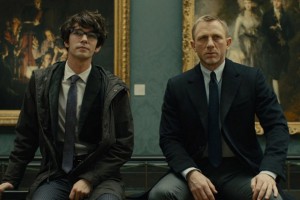[Originally published in GeneseeSun.com]
007: Family Values in the British Secret Service
Skyfall, dir. Sam Mendes, with Daniel Craig, Javier Bardem and Naomie Harris
At least in terms of the sheer number of feature films, James Bond is probably the number three cinema franchise of all time, if you consider only those based on individual characters, although he’s well behind the two top contenders, Dracula and Jesus Christ. There are now approaching 30 feature films alone, counting spoofs and current projects, based on novelist Ian Fleming’s notorious offspring. The earliest was 1962’s Dr. No, which starred Sean Connery, making this the 50th Anniversary appearance of the irresistible super-spy. Connery’s portrayal (8 films) of the apparently ageless 007 was followed by Roger Moore (7 films), Pierce Brosnan (4 films), and now Daniel Craig, in his third outing in the role to date, after Casino Royale and Quantum of Solace. Craig’s first time out, in fact, Casino Royale, was done as a spoof in 1967, back in the Sean Connery era. That odd piece of tripe starred both Peter Sellers and David Niven in the lead role, and was directed by John Huston, believe it or not, who also did a couple of cameo scenes, and is the only film I know of with a cast that includes both Woody Allen and Orson Welles.
Director Sam Mendes has a couple of action flicks on his resume, but even there he leans hard on psychology: the gangster flick Road to Perdition (2002), which explores the relationship between a Depression era hit man (Tom Hanks) and his young son; and Jarhead (2005), a Persian Gulf War flick that digs into the drama of waiting months, or a lifetime, really, for a 5-day war to start. Otherwise, Mendes’ work is more straight-up psychological family dramas, as in American Beauty (1999), a fairly – oh, serious, I guess – exploration of a middle-aged man’s midlife crisis, and more recently, Revolutionary Road (2008) and Away We Go (2009), about domesticity, or looming domesticity, in both the 1950s and the 2000s respectively.
The Bond series is an odd relic of the Cold War era spy vs. spy filmmaking, and the absence of the great evil, Russia, or actually the Soviet Union, makes for a serious challenge to contemporary filmmakers: make it relevant, or risk sliding into the category of costume drama. Skyfall has much of what we expect from a James Bond movie, including a mini-film opening with a ferocious chase scene, highly stylized credit sequences, distinctive visuals and exotic locations, and feats of extraordinary derring-do and physical prowess.
Skyfall is definitely a creature of the 21st century, though. At the surface level, the usual extremely cool gadgetry is mostly gone, sadly, in favor of digital trickery. “Q” (Ben Whishaw), or the Quartermaster, who is the usual Bond source for all things gadgety, in this film is little more than a computer hacker, although an extremely good one, who barely seems old enough to drink legally. More to the point, the cold war void is filled, or rather not filled, with a vague nod to the big evil of terrorism, and/or other related threats. Bond’s supervisor, “M” (Judi Dench), testifies before some governmental hearing into her management competence that the threat faced by the modern MI6 no longer comes from a big national enemy, but from the stateless, teamless, potentially even random faceless individual. For current audiences, in the current political climate, it’s a familiar message: You should be afraid – very afraid – of anything and everyone. And We will protect you. Or at least give it our best shot.
In fact in Skyfall, the evil villain turns out to be a rogue MI6 agent, Silva, played by the excellent Javier Bardem (No Country for Old Men), essentially a disgruntled employee with some deep psychological baggage revolving around M, who he creepily calls “mother.” Ironically, the threat is of our own making. Or, in this case, of MI6’s own making.
Skyfall’s plot is actually driven by a contrived stew of emotional and psychological drama. In addition to Silva’s stereotypical homoerotic pathology (don’t all gay men have issues with their mothers?), Bond himself carries nearly as much baggage. The second half of the film revolves around a remote Scottish castle-like orphanage called Skyfall, complete with a gamekeeper played by Albert Finney (echoes of Bourne, anyone?) and a kind of regression therapy into Bond’s backstory and his issues of parental abandonment, which the film suggests are at the root of his total inability to form real connections with other humans, but which also has the side benefit of making him such an excellent, colorful secret agent.
The overall feel of family/psychological drama must be largely Mendes’ doing, and reports are that he collaborated quite actively with the films’s writers, which included Bond veterans Neal Purvis and Robert Wade, along with Mendes’ previous collaborator John Logan. There is a new generation of 007 novels nowadays, of a type called “continuation works,” novels written in the same vein, with the same characters, as the original Ian Fleming series, but by other authors, and which in this case serve to modernize the franchise. Skyfall, however, is based on no literary source, neither Ian Fleming novels nor any continuation works. It also does not follow in any direct way from any earlier films, including the two Craig films, Casino Royale and Quantum of Solace.
Like pretty much every 007 movie, Skyfall is a genuine treat to look at, with attractive characters, the usual great visuals and locations, and terrific chase scenes that are lots of fun. Craig and Bardem play well together, although Silva doesn’t really hold a candle to Anton Chigurh, the genuinely atrocious bad guy that Bardem plays in No Country for Old Men. The problem is that the film doesn’t really have a good solution to the missing Russia problem, and it just bogs down under the weight of its own silly, overwrought psychology.
